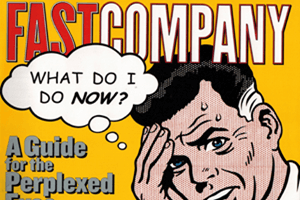Question
In your experience, is a broad liberal arts background an asset or an albatross? (I know, I know, I’m grossly glossing over differences in markets, technologies, regional employment issues, etc.) For the purposes of this discussion, let’s assume that our guinea pig has a liberal arts degree from a solid institution. Is the pig gonna succeed in business?
Nick’s Reply
 About 3 out of 4 employers say they want job candidates with strong writing skills. Far too many people in America, especially in the worlds of business and technology, can’t write to save their lives. And that’s because they spent most of their time in school studying one subject so they could become very smart specialists. But a liberal arts education almost always teaches people how to think critically, communicate effectively and how to write well.
About 3 out of 4 employers say they want job candidates with strong writing skills. Far too many people in America, especially in the worlds of business and technology, can’t write to save their lives. And that’s because they spent most of their time in school studying one subject so they could become very smart specialists. But a liberal arts education almost always teaches people how to think critically, communicate effectively and how to write well.
And guess what? There’s no such thing any more as a single career. You need to be able to grasp all sorts of knowledge and thinking styles to tackle the rapidly changing kinds of work that need to be done. That’s why the traditional job is dying. And that’s why a liberal arts degree can be a very valuable asset today.
Liberal arts and business jobs
It’s not my intent to start a “jobs war” between liberal arts folks and other professionals like scientists, engineers, lawyers or anyone else. My intent is to help people with liberal arts backgrounds see they have options.
I think liberal arts types are among the most valuable workers in business. They tend to have well-honed critical skills and a flexible perspective that can accommodate just about any business discipline. They need time to master a new domain, and that can require a serious investment! But people with technical, finance or specialist degrees face a complementary challenge if they lack the breadth of knowledge one typically acquires in the liberal arts.
Liberal arts grads often often allow their degree to turn into an albatross. If they can stop torpedoing themselves, their broad skills can make them successful almost anywhere. Lots of liberal arts-ers (L.A.’s) seem to disdain the business world. I’ve never been able to figure that out. It’s a hurdle to overcome. Everything is a business, even non-profit organizations that nuke whales, save oil and grow eco-friendly pomegranates. L.A.’s need to realize — even while they’re in college — that having a job will likely mean working in business.
The disdain often manifests itself as defensiveness. You know the attitude: “I don’t really want to be in business. It’s beneath me. Business is for making money, not for satisfying my need to do something important. I come from the ivory tower of academe. And you guys in business scare the pants off me because… how do you do all that stuff you do?”
That attitude hurts a lot of talented people who need a foot in the door.
Liberal arts: Ability to change
But if L.A.’s suffer from naïve career preconceptions, they can be great learners — heck, I’m living proof. I spent my time in college taking courses in everything from Astronomy to Comparative Literature, Biology to Creative Writing, Art History to Economics, and from Psychology to Approaches to The Renaissance (Man, that was one killer double-credit course). I’m not so smart about anything in particular, but my L.A. background has made me fearless. It’s made me a fool for learning new stuff.
I didn’t study programming or coding, but I spent a couple of years designing and writing business software. I have no project management education, but I spent another year salvaging an inventory management project that went off the rails because programmers and sales people (at a major corporation) couldn’t understand one another.
Learning quickly on the job again and again gave me the confidence to believe I can learn to do anything well, because as an L.A. type in college, I jumped from subject to subject. That became a skill in itself. And I believe that skill makes any liberal arts-er a potentially fine business person. I got religion when I realized business is just the work someone does. It’s all business.
Liberal arts can be your asset
I believe that almost any L.A.-er who’s serious about it can land a good job — or change careers — by applying the ability to write and communicate effectively. That’s the sign of a trained and disciplined mind. That’s one of the first things I look for when I evaluate a business person. Having said that, I also expect a clear demonstration that the job candidate has applied their liberal arts training to learn about my business and the job I’m trying to fill!
There are lots of specialists out there that an L.A.-er could run circles around — just because L.A.-ers can speak and write well. The challenge to the L.A.-er is to study the business you want to work in, gain enough of a grasp to hold your own, and to show how you will apply your skills to it. In some fields, of course, you may need some serious additional education to compete with the specialists, but I think you will find the skills you already possess will often make you a uniquely qualified candidate for some surprising jobs.
So yes, our guinea pig can succeed. If you have a liberal arts degree and want to work in business, technology, finance or any other field, you’ve got to do more homework. Lucky you, that’s what you’re good at. Then choose your target and go tackle the world.
Is a liberal arts education useful in your line of work? Why or why not? If you work in a specialized field, have you encountered (or hired) people with liberal arts degrees? Are liberal arts credentials an asset or an albatross?
: :




 This may be hard to hear, but the worst thing you can do is “really want this job.” The truth is, most interview processes go south. The only way to plan around that is to focus your next opportunity.
This may be hard to hear, but the worst thing you can do is “really want this job.” The truth is, most interview processes go south. The only way to plan around that is to focus your next opportunity.
 Sometimes you’ve got to make a choice between two job offers, or you’ve got to decide “Do I stay, or do I go?” Much of the time you can pretty easily judge the evidence supporting one choice or the other. But sometimes you can’t — because “I” gets in the way.
Sometimes you’ve got to make a choice between two job offers, or you’ve got to decide “Do I stay, or do I go?” Much of the time you can pretty easily judge the evidence supporting one choice or the other. But sometimes you can’t — because “I” gets in the way.
 Special Edition
Special Edition
 My compliments for not taking any action until you receive a bona fide, written offer from company B. Don’t risk your current job. And don’t let this blow up in your face!
My compliments for not taking any action until you receive a bona fide, written offer from company B. Don’t risk your current job. And don’t let this blow up in your face!
 Yes, I’m seeing more signing, or “starting,” bonuses nowadays. Let’s answer your questions in the order you asked them.
Yes, I’m seeing more signing, or “starting,” bonuses nowadays. Let’s answer your questions in the order you asked them.
 You can do something pretty obvious to avoid going to work for a questionable company or accepting the wrong job: meet everyone that will affect your success. It’s not really a strategy. It’s more of a tactic that will help you confirm a really good opportunity and keep you from getting a walk-on role in a nightmare. You shouldn’t write on your hand, but if you insist, write these two words: upstream and downstream.
You can do something pretty obvious to avoid going to work for a questionable company or accepting the wrong job: meet everyone that will affect your success. It’s not really a strategy. It’s more of a tactic that will help you confirm a really good opportunity and keep you from getting a walk-on role in a nightmare. You shouldn’t write on your hand, but if you insist, write these two words: upstream and downstream.
 It’s hard enough to identify top job candidates and entice them into an interview, and even harder to hire them. The last thing you want to do is alienate a potential hire by subjecting them to an unpleasant, disrespectful interviewing process.
It’s hard enough to identify top job candidates and entice them into an interview, and even harder to hire them. The last thing you want to do is alienate a potential hire by subjecting them to an unpleasant, disrespectful interviewing process.
 There’s way to help your employer give you a raise before you give your resignation. Who wants to go on job interviews when a well-managed performance review might get you what you want? You can make a performance review pay off better than a job interview, if you seize it. That means you must trigger the review even before it’s scheduled. With many employers worried about losing workers, I’m going to suggest a way to pull this off.
There’s way to help your employer give you a raise before you give your resignation. Who wants to go on job interviews when a well-managed performance review might get you what you want? You can make a performance review pay off better than a job interview, if you seize it. That means you must trigger the review even before it’s scheduled. With many employers worried about losing workers, I’m going to suggest a way to pull this off.
 There used to be a book titled something like 2,800 Interview Questions & Answers. Even today, you can find books that will automate your job interviews with canned repartee. These books feature 701 interview questions (and “best answers), or 201, or 189, 101 — or, How many interview questions you got???
There used to be a book titled something like 2,800 Interview Questions & Answers. Even today, you can find books that will automate your job interviews with canned repartee. These books feature 701 interview questions (and “best answers), or 201, or 189, 101 — or, How many interview questions you got???